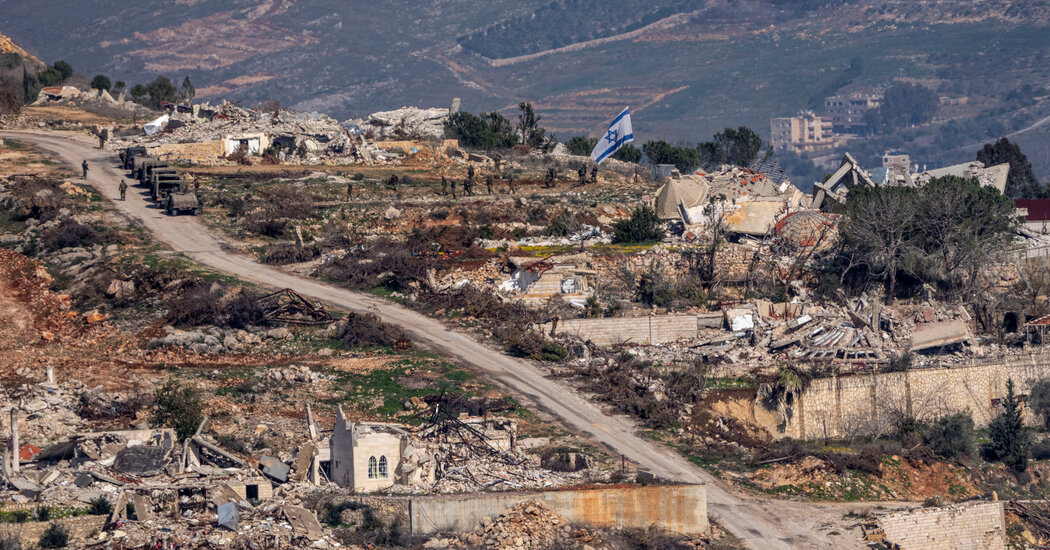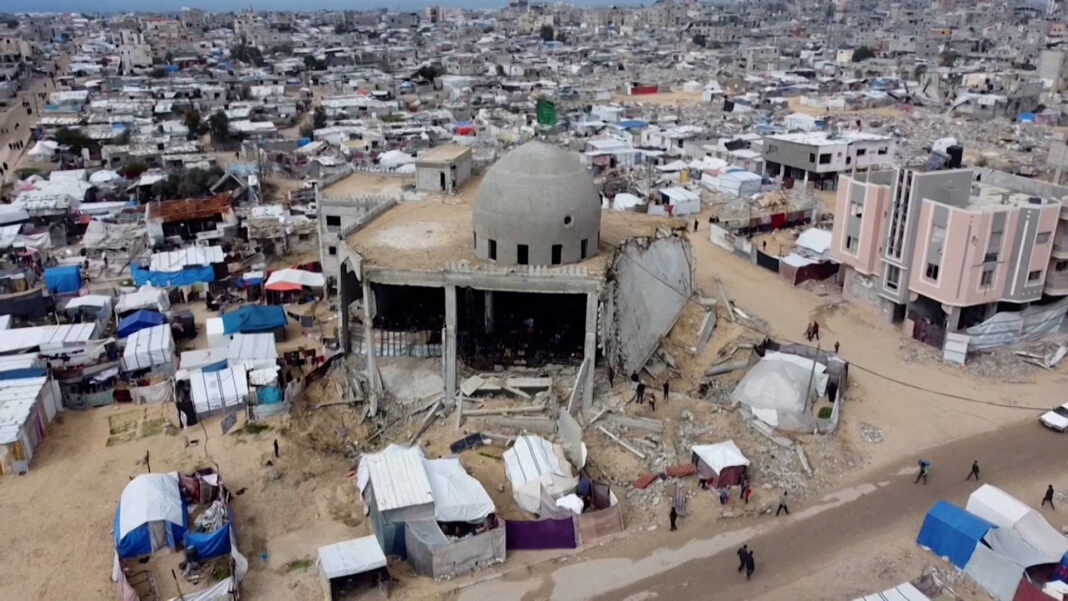Israel is set to occupy parts of southern Lebanon after a deadline for its full military withdrawal lapses on Sunday, the Israeli government implied in a statement on Friday, amid Israeli concerns that Hezbollah remains active there and doubts about the Lebanese Army’s ability to stymie the militia’s resurgence.
Under the terms of a truce between Israel and Hezbollah in late November, Israeli troops were supposed to withdraw within 60 days from areas of Lebanon that they had recently wrested from the group’s control. Hezbollah was also required to withdraw from the region, allowing the Lebanese military to assert its control over an area where Hezbollah, an Iran-backed Shiite force and political movement, had long dominated.
Less than two days before the deadline, the office of Benjamin Netanyahu, the Israeli prime minister, announced that Israel’s withdrawal was dependent on the Lebanese Army asserting its full control over the area, adding that the timeline was flexible and implying that Israeli troops would remain in Lebanon beyond the cutoff.
“Since the cease-fire agreement has not yet been fully enforced by Lebanon, the gradual withdrawal process will continue under full cooperation with the United States,” the statement from the Israeli prime minister’s office said.
Asked for clarification, the prime minister’s office declined to say if this meant that Israeli troops would definitely remain in Lebanon after the deadline. But Israeli leaders have told American and French mediators that they want to keep some soldiers in southern Lebanon beyond Sunday, according to three officials briefed on the negotiations.
There was no immediate response from Hezbollah or the Lebanese government. But in a statement released publicly on Thursday, Hezbollah said that any “breach” of the deal would not be tolerated, because it would be “a blatant violation of the agreement, an attack on Lebanese sovereignty and the beginning of a new chapter of occupation.”
Hezbollah officials did not respond to accusations that Hezbollah has failed to live up to its commitments and that the Lebanese military had not yet taken control of the territory in question. Its media relations office said the group was “committed” to the terms of the cease-fire deal but would not go into further detail.
Violations of the truce are monitored and investigated by a committee chaired by the United States and involving France. Hezbollah has called on those international monitors and the Lebanese government not to allow “any pretexts or excuses for prolonging the occupation,” but did not say what action it would take if Israeli troops remained.
After two months mostly without conflict, despite occasional violations, the specter of renewed fighting looms again, even if Hezbollah, battered and exhausted, no longer poses the same threat to Israel as it did at the start of the war nearly 16 months ago.
If Israeli troops do remain beyond the weekend without Lebanon’s blessing, Hezbollah will have to choose between accepting the status quo and losing face — or resuming battle and risking a large Israeli counterattack that would further damage both its decimated ranks and Lebanese civilian infrastructure. Should fighting restart, Israel’s defense minister, Israel Katz, has warned that Israeli strikes would no longer differentiate between Hezbollah and the Lebanese state.
“It’s a serious dilemma for Hezbollah. They are damned if they resist and damned if they don’t,” said Nicholas Blanford, a Beirut-based analyst for the Atlantic Council, an American research group. “Hezbollah’s supporters will not thank the party for resuming war when they are trying to return to their homes and begin rebuilding.”
Since November, Israel has transferred more than 100 military installations and villages to the Lebanese authorities, but still occupies roughly 70 percent of the areas that it captured after invading Lebanon last fall, according to Andrea Tenenti, a spokesman for UNIFIL, the United Nations peacekeeping force in southern Lebanon.
Israeli officials say that the Lebanese Army has yet to signal its willingness to fill the void in those areas, all which are south of the Litani River. Mr. Tenenti said that the Lebanese military stood ready to do so but could not enter places that the Israeli military has yet to vacate.
Asked for comment, the Lebanese military referred to a public statement in which it said that it “maintains readiness to complete its deployment in the area south of the Litani River immediately after the Israeli enemy withdraws from it.”
In recent days, Israeli troops did not appear to be preparing for a complete evacuation, according to an official and an Israeli military officer who also spoke on the condition of anonymity to speak more freely.
The deadline poses an early quandary for President Trump, who strongly backs Israel but campaigned on a promise of peace for Lebanon.
It is also a test for Lebanon’s new leaders. President Joseph Aoun and Prime Minister-designate Nawaf Salam, both selected this month, need a peaceful environment to rebuild Lebanon after years of war, political chaos and economic catastrophe. Their authority risks being undermined if they prove powerless to control their own territory and influence either Hezbollah or Israel.
The new Lebanese leadership “has yet to demonstrate adequately that it can be a confident leader in managing Hezbollah — a weakness that, of course, Israel is going to continue to exploit as justification for staying past the deadline,” said Sanam Vakil, the director of the Middle East program at Chatham House, a London-based foreign affairs research group.
The current conflict began after Hezbollah’s ally Hamas attacked Israel on Oct. 7, 2023, killing about 1,200 people and taking some 250 hostages. The next day, Hezbollah began firing rockets at Israeli military positions in solidarity with Hamas, and Israel fired back, leading to daily exchanges that displaced hundreds of thousands of Israeli and Lebanese civilians and damaged towns on either side of the border.
The fighting escalated last summer, after a rocket from Lebanon killed a group of children and teenagers in an Israeli-controlled town. Israel assassinated most of Hezbollah’s top leadership, sharply increased its bombardment of Hezbollah strongholds and then launched a ground invasion into southern Lebanon.
The Israeli offensive destroyed whole neighborhoods, displaced more than a million people and killed several thousand, including many civilians.
The war also led to direct confrontations between Israel and Iran, Hezbollah’s main backer.
Bruised and distracted, Hezbollah and Iran were both powerless to prevent the collapse of a third member of their alliance, the Syrian government. President Bashar al-Assad of Syria was toppled by rebels in December, making it almost impossible for Iran to send arms to Hezbollah through Syrian territory. Within Lebanon, Hezbollah’s strength was diminished, leading to the rise of Mr. Aoun and Mr. Salam, who both promised to restore the cohesion and authority of the Lebanese state.
Israeli leaders privately say that a stronger Lebanese government is in Israel’s interests, because it could further curb the influence of Hezbollah, which opposes Israel’s existence. Hezbollah was founded in the 1980s, partly in response to a previous Israeli occupation of southern Lebanon, which lasted until 2000. The militia’s weaponry gave it outsized influence over Lebanese affairs, with some comparing it to a state within a state. Now, the group is at its weakest ebb in decades.
But Israel is prepared to stay within Lebanon, denting the new Lebanese leadership’s authority, with its officials arguing that Hezbollah still retains the resources and the ambition to pose a threat to Israeli villages along the border.
Thousands of displaced Israelis have yet to return to their homes, fearful that Hezbollah will not adhere to the terms of the cease-fire and rebuild military infrastructure within firing range of Israeli communities.
Israeli officials complain that the Lebanese Army has yet to mobilize enough forces to replace Israeli troops in several key places, preventing the truce from being implemented in full. And they say that Hezbollah’s forces have yet to leave southern Lebanon, breaking the truce’s terms and forcing the Israeli military to remain in place.
The Lebanese Army has deployed to major towns and villages in southern Lebanon in recent weeks, mostly in places close to the Mediterranean Sea, in the southwest of the country. It has also deployed specialized units to remove rubble, dispose of unexploded ordinance and reconstruct roads that were destroyed. Army officials say they have operated in coordination with the international committee supervising the cease-fire.
But Lebanese soldiers have yet to take charge of the borderlands further to the east, with the exception of the area around Khiam, a town in southeast Lebanon that was the site of fierce fighting during the war.
An Israeli military officer, speaking on the condition of anonymity to speak more freely, said the Israeli Army had made no attempt to dismantle roughly half a dozen military bases built in recent months along a narrow strip, less than a mile wide, north of the Israel-Lebanon border.
The expectation among soldiers at the front, the officer said, was that they would remain in place for the foreseeable future to prevent Hezbollah’s return there.
Dayana Iwaza contributed reporting from Beirut, Lebanon; Johnatan Reiss from Tel Aviv; and Christina Goldbaum from Damascus, Syria.


